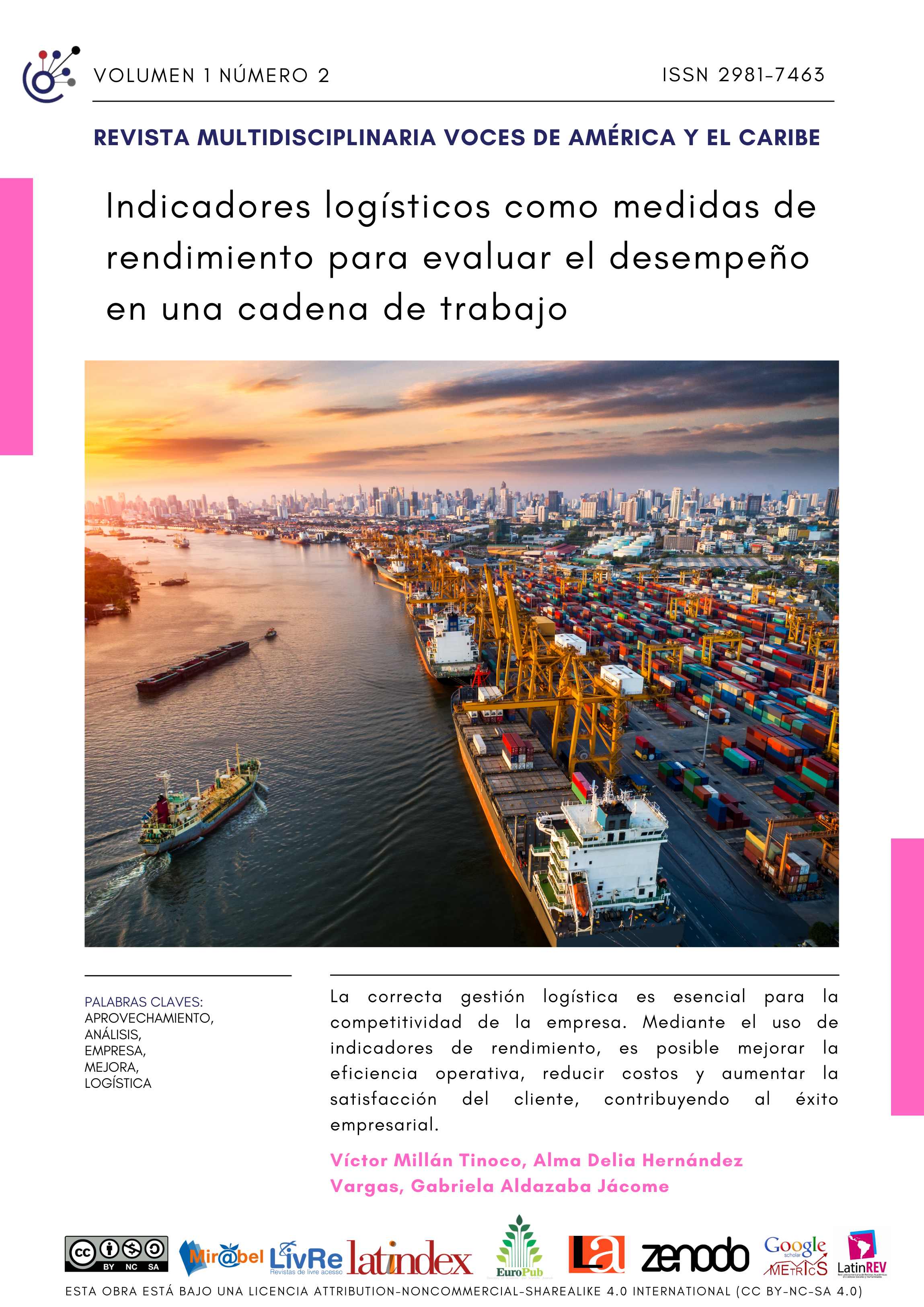Logistics indicators as performance measures to evaluate performance in a work chain
DOI:
https://doi.org/10.5281/zenodo.13623876Keywords:
Utilization, analysis, company, improvement, logisticsAbstract
Context: Logistics is fundamental to the operational efficiency of companies, directly affecting customer satisfaction and profitability. Without proper management, resources are often wasted, and operational failures occur. Objective: To evaluate the logistics performance of the company Aceros y Materiales RC S.A. de C.V. using logistics indicators, in order to identify areas of opportunity to improve operational efficiency and customer satisfaction. Methodology: A non-experimental field study was conducted, combining exploratory, descriptive, explanatory, and correlational studies. The logistics system was observed in its natural environment, historical data were collected and analyzed, and problem areas were identified to propose improvements. Results: Failures were identified in warehouse and transportation management, affecting delivery times and safety. The implementation of performance indicators allowed the identification of opportunities to optimize logistics operations, reducing costs and improving efficiency. Conclusion: Proper logistics management is essential for the competitiveness of the company. By using performance indicators, it is possible to improve operational efficiency, reduce costs, and increase customer satisfaction, contributing to business success.
Downloads
References
Arenal, L. C. (2020). Optimización de la Cadena Logística. Logroño (La Rioja): TUTOR FORMACIÓN.
Azevedo, S. G., Ferreira, J., & Leal, J. E. (2019). A framework for logistics performance monitoring using key performance indicators. International Journal of Productivity and Performance Management, 68(3), 417-436. https://doi.org/10.1108/IJPPM-07-2018-0267
Chopra, S. (2020). Administración de la cadena de suministro estrategia, planeación y operación. Ciudad de México: Pearson Educación de México.
Chopra, S., & Meindl, P. (2020). Supply Chain Management: Strategy, Planning, and Operation (7th ed.). Pearson.
Flamarique, S. (2019). Manual de Gestión de Almacenes. Barcelona, España: Marge Books.
Franco, V. I. (2020). La relación entre logística, cadena de suministro y competitividad: una revisión de literatura. Espacios, 184-187. https://www.revistaespacios.com/a20v41n19/a20v41n19p13.pdf
J.F. Estévez García, M. P., & Fresán., p. d. (2007). Sistema de indicadores para el diagnóstico y seguimiento de la educación superior en México. ResearchGate, https://www.researchgate.net/publication/31844922_Sistema_de_indicadores_para_el_diagnostico_y_seguimiento_de_la_educacion_superior_en_Mexico_JF_Estevez_Garcia_MJ_Perez_Garcia_prol_de_M_Fresan
Mauleón, M. (2006). Logística y Costos. Madrid: Días de Santos.
Pacheco, E. (2020). La gestión del almacen en las PYMES. Ciudad de México: WOLTER KLUWER.
Ruiz, A. H. (2015). Diseño y Organización del Almacén. España: Ideaspropias.
Sampieri, R. H. (2018). Metodología de la Investigación. Ciudad de México: Mc Graw Hill.
Sampieri, R. H., Collado, C. F., & Lucio, P. B. (2018). Metodología de la Investigación (6th ed.). McGraw-Hill Interamericana.
Sánchez, Y. R. (2020). Metodología de la Investigación. Ciudad de México: Prentice Hall.
Serrano, M. J. (2014). Logística de Almacenamiento. Derecha Madria, España: Paraninfo, SA.
Socconini, L., & Barrantes, M. (2020). La metodología japonesa para mejorar la calidad y la productividad de cualquier empresa. Valencia, Barcelona: Marge Books.
Wang, G., Gunasekaran, A., Ngai, E. W., & Papadopoulos, T. (2021). Big data analytics in logistics and supply chain management: Certain investigations for research and applications. International Journal of Production Economics, 176, 98-110. https://doi.org/10.1016/j.ijpe.2016.03.014
Yañez, C. (2020). Sistema de gestión de la calidad. International eventos, 10. https://core.ac.uk/download/pdf/10851013.pdf

Downloads
Published
Issue
Section
License
Copyright (c) 2024 Víctor Millán Tinoco, Alma Delia Hernández Vargas, Gabriela Aldazaba Jácome

This work is licensed under a Creative Commons Attribution-NonCommercial-ShareAlike 4.0 International License.
Voces de América y el Caribe adheres to the Creative Commons Attribution-NonCommercial-ShareAlike 4.0 license. Under this license, others are allowed to remix, tweak, and build upon your work non-commercially, as long as they credit you for the original creation. Their new works must be under an identical license as the one that covers the original work. For more details on this license, please visit https://creativecommons.org/licenses/by-nc-sa/4.0/.
By publishing in our journal, authors agree to these conditions where others may share, use and adapt their work, as long as it is done non-commercially and with proper attribution given to the original work published in Voces de América y el Caribe.























